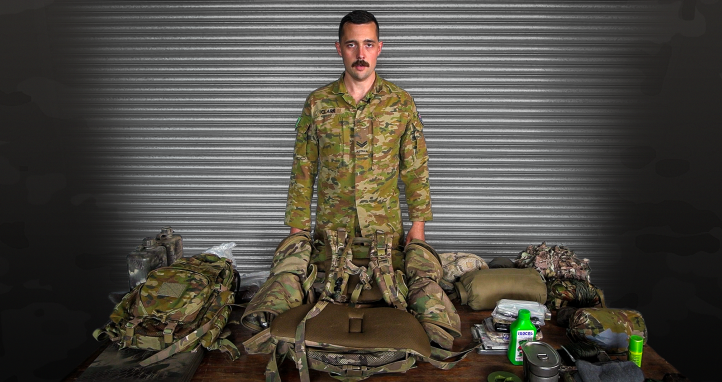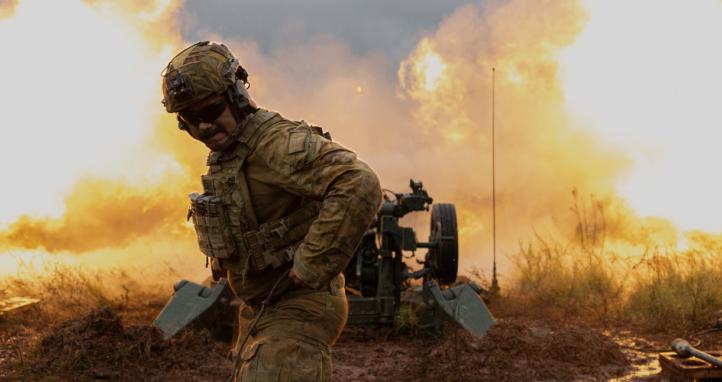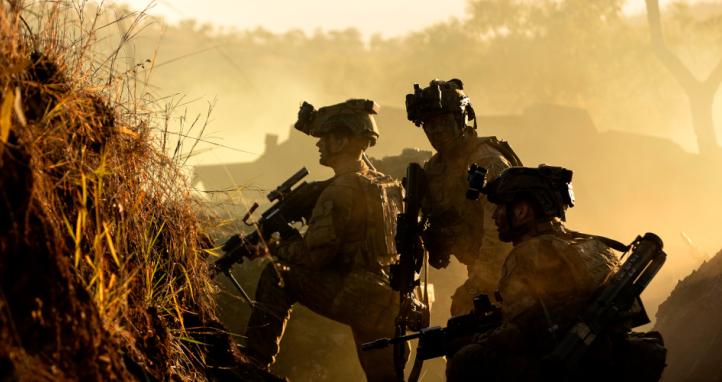The phrase ‘Keep Calm and Carry on’ came out of the British Government in 1939 to prepare the populace for World War II. It has been a mantra of mine, which has been refined, tested, and depended upon many times during my adult years – never more than in the last two and a half years.
To analyse Shakespeare’s quote – ‘Some are born great, some achieve greatness and some have greatness thrust upon them’ – does the same approach apply to resilience? Are people born resilient? Do some achieve resilience, or do some have circumstances requiring resilience thrust upon them? Do these situations require them to figure out the measure of their mettle by having resilience forced upon them? These are my views based on my experiences and are very personal.
I have been medically discharged from the Australian Army. Paralysis and seizures were confronting – going blind in one eye three times was simply terrifying. Everyone has a tipping point when they determine that ‘enough is enough’. At least, that is what it was for me. Everyone has a limit in some way, shape or form. At least, that was the case for me.
This article is a story about me, however, it is not about me. It is hopefully illustrative to some, and it has been a good experience to share my thoughts on a word that has arguably never been more pertinent for so many around the world.
Throughout my challenges, my mantra has been ‘keep calm and carry on’. I like to think I have stuck to that.
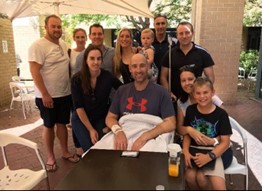
Me, Wheelchair-bound in Hospital – February 2019
Forged By Fire
In the last 24 months I have battled diabolical medical issues. This has included paralysis, seizures, and repeated complete vision loss in one eye. None of this, apart from vision loss, has been permanent; however, it has undoubtedly changed my life. Time off work has allowed me to reflect on what I have been through, and I have considered how my approach to these challenges has affected my recovery. I have wanted to reflect on what I have learned in the event it is of use to those who may be interested.
When I look at my life, I think that I was born resilient, I then achieved resilience, and then I had the requirement to be resilient thrust upon me several times. I feel truly tested by tough times and feel somehow stronger for having experienced them. Like with diamonds, some instances of enormous pressure result in a shinier outcome.
Being Born Resilient
I was born 3 months premature at 980gms as one of two identical twin boys. Tragically, my brother Jeremy died 4 hours after his birth. He was slightly heavier than me at over 1 kg.
We were incredibly tiny, fragile and vulnerable. I had 3 months in a humidity crib. I was lighter and yet I survived. The doctor had told my mother the night before that it was unlikely either of us would survive. I do not know how or why I survived, but I did. Perhaps an innate resilience? Pure dumb luck. I do not know. But I made it. I am obviously thankful for that.
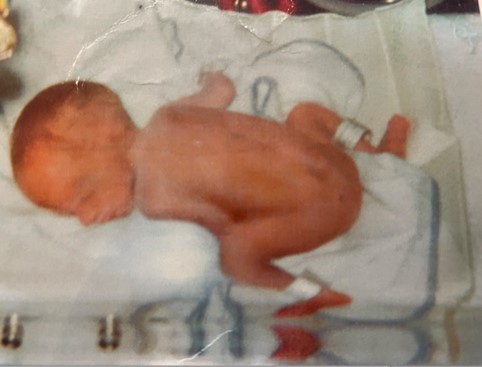
Me as a premature baby in a humidity crib – May 1979
Becoming Resilient
I was a shy, timid, very reserved child. Over time, I became a very tall, almost gangly, reserved young man. Being 6 foot tall at 12 years old made me stand out, but I was still shy. I had a very physically active childhood – with basketball, long walks, and rabbit shooting with my father. This was before the advent of the internet so I entertained myself with a lot of physical activity. I think this resulted in me being physically resilient, which in turn enables mental resilience. I believe they are inextricably intertwined.
Pushing yourself mentally can result in physical outcomes and conversely, being pushed physically makes you realise your mental abilities. This took me time to develop into a robust young adult and to keep physically active, primarily through a sport I still love: basketball. My love of the game made any physical exertion almost feel effortless as I was so engaged in the sport. Physical benefits were forgotten in the mental process of a constant offensive or defensive mindset – and trying to dunk a basketball!
Having The Requirement To Be Resilient Thrust Upon Me
In 2004, I joined the Army. I wasn’t in peak physical condition, but I was fit. The training at the Royal Military College – Duntroon was physically demanding and forced resilience upon me. I was in a group of like-minded individuals and in a very structured environment. I will be frank in saying I was not much of a runner (apart from basketball) and the requirement to run was forced upon me.
After graduating in June 2005, I deployed to Timor Leste from September 2006 to March 2007, and subsequently I deployed to Afghanistan in 2010. During this time, I was the commander of a patrol when two soldiers under my command died. Very rarely during the deployment did I think about myself. The soldiers were under my command and were my responsibility. They were resilient so I had to be resilient. There were no other options. Not everyone has that responsibility nor opportunity. It is never just about you.
Medically, I have had an incredibly rare and complex neurological condition which defied diagnosis for almost two years and I will deal with it for the rest of my life. I have no choice and have decided to make the best of a bad situation.
Coping Mechanisms – What Worked For Me
Adopt An Attitude Of Gratitude
As Monty Python said: “always look on the bright side of life”. It is easy to question your circumstances, to ask ‘why did this happen to me?’ This is normal. I am no psychologist, however I have found focusing on finding the positives to be very beneficial. I may be an eternal optimist, but that is me. I look for the silver linings no matter how small they may be. That can be tough, but it just requires a different aperture to look through.
I never met my maternal grandfather. He had been a prisoner of war in World War II.
My mother has told me that he was an eternal optimist and was very happy every day to be alive and home. That never left me. My mother advises me that I share some of his traits. I am very grateful for what I do have. When I couldn’t walk and was wheelchair bound, I could still wheel myself around in my wheelchair and have some autonomy. Likewise, when I used a walker and then walking frame, I felt my autonomy growing by the day. I will be honest in saying my motivating factor was to get a cup of coffee from the hospital cafe! That was driven by two factors: firstly, huge doses of intravenous corticosteroids made me enormously hungry; and second, hospital food is nothing to write home about!
It Is Never All About You
In the hardest time, it is understandable to adopt a ‘woe is me’ mentality and that is normal; however, you are not on your own when you are dealing with stress, anguish and turbulence. People who care about you will be dealing with your issues – stress, uncertainty, sleeplessness, and concern. I found it very beneficial to put myself in their shoes and try and imagine how they felt. There were many times when my condition couldn’t be determined, so instead of dwelling on that I focused on what I did know. That I was very lucky to have the very best of care and support. I tried to ameliorate their stress by remaining positive. I wasn’t stressed by my situation as I had, and continue to have, the absolute best of care available in Australia. I was, however, concerned by how stressed my family, friends and colleagues must have been.
Despite them showing a very brave face, I knew it must have been tough. Having been a fit 6”4, 115kg Infantry Officer, I wasted away to 98kg. The above photo paints a pretty grim picture and was confronting for all who visited. Many friends have confided in me that they left the hospital in tears. That was very hard to hear.
Tough Times Don’t Last But Tough People Do
I do not want to sound like a motivational t-shirt; however, I do believe in the above mantra. I have seen other people get through incredible adversity. Relatives and friends have been through extraordinarily tough times and have gone on to continue to live a fulfilled life. Additionally, I have read a lot about people who have survived incredibly adverse conditions in peace and war and have come out the other side stronger.
There have been times that I could see no light at the end of the tunnel, so I envisaged my own end state. That could have been a small goal at the end of the day. Something that in normal everyday life prior to getting ill I wouldn’t have given a second thought, but now it was my single focus. That helped me forge ahead. I thought about little goals. Like eating the elephant one bite at a time. It breaks time into tiny portions which somehow makes things manageable.
Pack Your Own Parachute, But Have A Reserve
I developed my own methods for coping. I never grumbled, which is not in my nature. I kept my sense of humour. When I was seriously ill, my temperature varied at times between almost hypothermic and running a very high fever. A family friend once went to touch my forehead to check my temperature. As he did that, although I was almost unconscious, I had the presence of mind to ask if he was giving me my last rites.
I found keeping a sense of humour had a profound effect on me, and also those around me. When people cheered up around me, it cheered me up, so it was win-win. I packed my parachute by steeling myself to achieve goals. Being a tall Infantry Officer, one of my strengths was the ability to march long distances. Losing the ability to walk was tough and I at times envisaged myself being in a wheelchair. This fuelled my motivation to work as hard as I could. Despite the challenges, I had absolute faith in so many, which emboldened my own motivation to achieve rehabilitation.
The reserve to my parachute were my medical staff, family, and friends. My neurologist was (and is) unflappable. I knew I was in the best of care. He impressed me by saying ‘I don’t know’ when I asked what was wrong with me. I found that strangely comforting as I knew he wasn’t telling me any half-truths just to make me feel better.
The support of my family and friends was incredible. My mother told me outright ‘anything you need and I will do it’ and I believed her 100%. The support from so many was my reserve. I knew that no matter what – they were there as an unbreakable safety net if I needed them.
That was a bedrock of support that was unwavering.
Catastrophise, Hypothesise, Rationalise
The worst scenario I have faced was the prospect of going blind. Seizures had caused inflammation to shoot down the optic nerve to my right eye, which caused me to go completely blind in my right eye 3 times. This was truly terrifying. In combat you can get angry at the enemy. You can target them, and you can protect yourself personally and the comrades beside you. It is truly hard to fathom how scary it is when it is your own body that betrays you. You can’t hate yourself. It is a very confronting feeling when you’re used to being robust and capable.
What I learned to do when faced with complete blindness was catastrophise – what is the absolute worst that could happen? For me that was complete blindness in both eyes.
That would occur if I had more seizures, which after three in as many months seemed to be a real risk. This forced me to consider what life would be like being completely blind.
I realised it was my greatest fear, as I imagine would be the case for many people. However, I realised that I would still be alive and that many people lived every day to the fullest despite being completely blind or vision impaired.
I then hypothesised about how I would live my life it I was completely blind. I realised there is a lot of support for people who, as mentioned, live their lives that way. Whilst scary, I focused my mindset on knowing that I had – as I did in hospital – complete support in every facet of my recovery. That was very reassuring.
After looking at the catastrophic and hypothetical situations, I then rationalised them. I considered the odds of more seizures. I knew I could be at a hospital within 30 minutes. I knew I had my neurologist’s mobile phone number (which is not the norm) and could call him at any time. I had done that previously and had been given guidance that if any changes had occurred to my eyesight to come straight to emergency. He would meet me there and walk me straight through.
Being able to plan for and rationalise the worst case scenario was very calming. Nothing would be immediately dangerous health-wise and I could get treatment immediately. That made me feel much more in control of the situation. A situation, which did not (and hopefully won’t) eventuate.
Understanding Resilience
Resilience means different things to different people. For some people it occurs in getting through the daily grind of life by dealing with crippling situations – whether they be mental, physical, financial, or social. Some people have no easy days. Others are required to be resilient on occurrence, through a chosen activity or through having a circumstance thrust upon them that requires them to be tested. Some of the above circumstances cannot be foreseen. Some are the ‘life-lottery’ which determines both what challenges you face and how you deal with them.
Personally, I have found the above tenets helpful. I really believe in the concept of Kintsugi. Kintsugi is the Japanese method of repairing broken pottery by mending the areas of breakage with lacquer mixed with powdered gold. This is used as a metaphor for embracing imperfections. Although I have been through a lot, I feel much stronger. You cannot see my cracks, nor the ‘repairs’; however, I know having gone through some tough times that I could face them again.
Resilience is deeply personal, as are the challenges people face. Resilience can be daily, weekly, or purely on occurrence. I have found that being challenged in a number of facets, I have relied on keeping calm and carrying on. I remain eternally grateful for the support of so many and remain ready to support those that I know if they ever need it.

